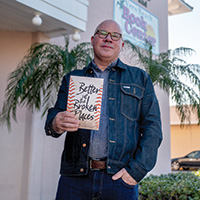 ‘Empowered’: Abuse victim’s book aids healing
‘Empowered’: Abuse victim’s book aids healing
STORY BY MARY SCHENKEL (Week of January 19, 2023)
Photo of Jeffrey Pickering, president/CEO of the Indian River Community Foundation
Jeffrey Pickering, president/CEO of the Indian River Community Foundation, can vividly recall the panic attack he experienced on Oct. 16, 2017. It unleashed a flood of disturbing images from a quarter of a century earlier; of being sexually abused as a teenager by his Orlando-based pediatric orthopedist.
Over the past five years, Pickering has worked to heal his own psyche, while also working to have the license of the still-practicing physician revoked and advocating for improved laws to protect other children.
His horrifying experience, the healing process, and his quest to help others are outlined in his book, “Better at the Broken Places,” for which there will be a book signing at 6 p.m. Jan. 25 at the Vero Beach Book Center.
“I spent a good couple of years trying to not only deal with it emotionally, but to make sense of what I could do, once I figured out that this doctor was still practicing,” says Pickering.
“I couldn't sleep, thinking that it was a possibility with other people. And I didn’t have any proof whether it was or wasn’t.”
His own abuse occurred during his high school years, from February 1990 through August 1991 and, through his research, Pickering discovered that there had been a criminal trial accusing the doctor of similar abuse in 1994. The boys and their families were no match for the doctor’s malpractice insurance attorneys, and he was acquitted.
“You really have to have cold evidence to be able to convict these people. They know that no kid is going to walk out of this situation with their own evidence, so the only evidence that exists is if the doctor makes a mistake, like in the Nassar case,” Pickering explains, referencing the hundreds of women athletes sexually abused by Larry Nassar under the guise of ‘medical treatment.’
“When you think about the boogeyman, it's as bad as it gets. But it happens. It seems to happen with trusted people in positions of authority; doctors, clerics, teachers, coaches or a family member,” says Pickering.
“But as was the case with Nasser, Sandusky, the priest scandals, there are people who don’t want to believe it. Either that or they had it happen to them and don't want to knowledge it. I would imagine that’s more often the case. This is such a painful thing to talk about, but all you want is to be believed.”
As abuse progressed, Pickering says he knew that what the doctor was doing wasn’t right, but as a teenage boy he was too embarrassed to say anything.
“When you're in there by yourself, the way it goes down is very different than what the clinical description is,” says Pickering. Then, during his final visit to the doctor, he recalls being drugged and raped.
“Basically, I was incapacitated. I remember coming to, leaving disoriented. I know I was in total shock. I drove to college and then I just buried it. It’s taken me a long time to sort out the details, but my memory is crystal clear.”
When the memories did resurface, Pickering says it was like looking at an old film strip.
“My brain just took over and it was flashing these images and I was piecing them together going, OK, these are trouble. And the way it was feeling was like it was happening right then. I just couldn't understand what was happening; what was I remembering?”
After that first panic attack, he had a second one when he took his oldest son, about 14 at the time, for a sports physical.
“That’s when I knew, I’ve got to get some medical help for this,” says Pickering.
Two years ago, Pickering went public with an 18-episode blog, StillPracticingMeToo.fyi, in hopes that by sharing his story, other victims of sexual assault might realize that they are not alone and reach out for help.
As a result of the blog, others came forward with similar accounts, including a childhood friend raped by the same doctor at age 14.
“So many of these people that have reached out have said just by mentioning this, it's helped them get their head on straight,” says Pickering.
“I think my voice is unique because I am a male, I’m a relatively stable and successful professional, and I’ve got a supportive spouse. Why in the world would I make this up?”
Pickering also began working to end the doctor’s affiliation with AdventHealth, and to have his medical license revoked. He was successful with the first, but not the second.
On the advocacy front, he became involved with the group that successfully sponsored “Donna’s Law,” signed into effect in Florida in 2020, which changed the statute of limitations, going forward, for sexual battery on victims younger than 18 at the time of the offense.
Pickering says the organization that helped get the law over the finish line is Child USA, the nation’s leading child protection advocate. One of its initiatives is statute of limitation reform, because it’s different in each state.
He stresses that from a mental health standpoint, it is important to be able to raise your hand and say, ‘I need help.’
“It shouldn’t be taboo to say I’m really having a hard time,” says Pickering. He points out that the goal of “UnStruggle,” the new Mental Health Collaborative campaign, is to take the stigma away from mental health issues.
Pickering says that hearing the words come out of his mouth as he told his wife, doctor, therapist and close friends, was one of the hardest things he has ever done, and considers himself lucky to have their support.
“But personally, the more I say it, the more I feel empowered. I thought I was a freak, but apparently this happens to something like one in six men.”
Despite that it is an uncomfortable subject, he feels that as a well-connected community leader, it is incumbent upon him to tell his story so that others might come forward and seek the help they need.
“If the permission to get help is not there, or if it's too complicated to get there, I don't think people can overcome this stuff,” says Pickering, noting that too often, victims turn to alcohol, drugs or suicide.
“My ability to overcome this is exclusively tied to the response I got from the people that I told first. Once I said it, to have people say, ‘I’ve got you,’ was amazing.”
Pickering says he has “incredible respect” for organizations such as the Mental Health Association, the Mental Health Collaborative’s McCabe Connection Center, Treasure Coast Community Health and Whole Family Health, all of which are accessible to everyone, regardless of their financial situations.
The title of the book, “Better at the Broken Places” is a riff on Hemingway’s line, “The world breaks everyone and afterward some are strong at the broken places.” From “A Farewell to Arms.”
“My feeling is, I'm better at the places that were broken, and it's almost exclusively as a result of two things – people's kindness and my ability to access the help that I needed when I needed to.”



